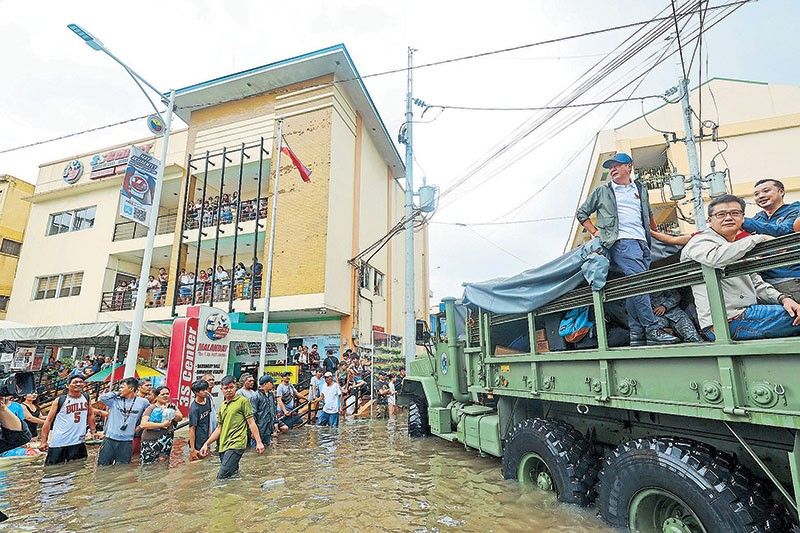Flood-damaged schools to defer class opening

MANILA, Philippines — Schools damaged by Typhoon Carina or still with numerous concerns to address might have to postpone the opening of classes on Monday, Education Secretary Sonny Angara said yesterday.
“Some schools will really have to postpone their openings kasi maraming aayusin at lilinisin (because they would have plenty of concerns to address),” Angara said.
“But those with none or with minimal damage, they would push through with the opening,” he added.
The Department of Education (DepEd) reported yesterday that about 90 schools all over the country suffered damage placed at P600 million, with reconstruction estimated to cost P630 million.
Angara said he would be issuing a list of areas where the opening of classes would be deferred, adding that he had ordered DepEd regional directors to work with principals to determine the readiness of schools for the opening of classes.
“We will not force the schools that were damaged and might have difficulties if they open their classes on Monday,” Angara said.
Earlier, DepEd reminded schools to provide students with instructional support should the students be forced to stay in evacuation centers for one week or more during times of disasters.
To prevent prolonged on-site class disruptions during the rainy season, DepEd also asked local government units to no longer use public schools as evacuation centers during typhoons and other calamities. While DepEd only allows the use of schools as evacuation for a maximum of 15 days, some regional and division offices go past this moratorium at the request of LGUs.
As of 2019, buildings being used for educational purposes outnumber actual structures dedicated to evacuees during natural calamities.
In the provinces, Mayors Benjamin Magalong of Baguio City and Romeo Salda of La Trinidad, Bernard Waclin of Itogon and Armando Lauro of Tublay – all in Benguet province – issued directives to postpone classes in all school levels and work in government offices.
However, those involved in frontline services – like emergency response, delivery of basic, health and medical services as well as disaster risk reduction and management teams – are ordered to report for work.
Pangasinan Gov. Ramon Guico III and Dagupan City Mayor Belen Fernandez issued a similar directive for their respective constituents.
Landslides were reported in the provinces of Benguet, Mountain Province and Abra, forcing road closures.
Insurance claim
Meanwhile, the Bureau of the Treasury is preparing to file claims for 45 public schools damaged by Typhoon Carina as part of the national indemnity insurance program. The NIIP provides comprehensive cover to government assets against fire, lightning, typhoons, floods, earthquakes and volcanic eruptions.
When the program commenced this year, the Treasury secured coverage for an initial 132,862 school buildings nationwide with a total insured value of P843.11 billion. The Treasury covered the premium for the pilot program using the excess payout it received from the catastrophe bond.
In a statement, the Treasury said it is now coordinating with DepEd and the Government Service Insurance System (GSIS) for the filing of insurance claims.
DepEd reported 45 public schools have been affected by the typhoon, saying the cost of damage has so far reached P308.5 million. Once a payout is confirmed, the DepEd will be able to utilize the funds for the repair and reconstruction of the schools.
Finance Secretary Ralph Recto emphasized that protecting national assets is crucial in ensuring the economic security of Filipinos.
“Poor school facilities negatively impact both teachers and students, leading to lower human capital development, reduced economic productivity and persistent poverty,” Recto said.
The NIIP is part of the country’s disaster risk finance strategy, which aims to protect the government’s fiscal health, provide immediate liquidity post-disaster and reduce the impact of disasters on the most vulnerable.
Insured by the GSIS, the NIIP aims to cushion government finances from unexpected losses arising from disaster events such as typhoons and earthquakes and ensure access to funding post-disaster for reconstruction.
Unlike the often single-asset insurance purchase, a portfolio approach was taken to spread out the risk and maximize the available premium budget. Under the law, GSIS is mandated to provide insurance cover to all government assets and properties with insurable interests.
Meanwhile, the Alliance of Concerned Teachers (ACT) is questioning the government’s flood control projects, worth over P200 billion, after Carina inundated hundreds of communities, damaging infrastructures, including public schools ahead of the school opening on Monday.
“President Marcos boasted of over 5,500 flood control projects with a budget exceeding 200 billion pesos. Yet here we are, witnessing extreme floods that have devastated communities across the country, including facilities in public schools. Where are these supposed flood control measures?” said ACT chairman Vladimer Quetua.
ACT criticized Marcos’ “empty rhetoric” on climate responsibility and justice, highlighting the administration’s alleged glaring lack of concrete climate adaptation and mitigation measures.
“The President claims the Philippines is resilient and prepared for calamity damages. But the facts on the ground tell a different story – with not even a hundred evacuation centers built in two years, our public schools are once again compelled to receive our hapless countrymen who need emergency shelter,” Quetua said.
“This clearly demonstrates the administration’s lack of priority and efficiency in Disaster Risk Reduction and Management. How often do we have a disaster like this where children’s education is sacrificed because of the negligence of the government?” he said. – Louise Maureen Simeon, Artemio Dumlao, Cesar Ramirez
- Latest
- Trending




























